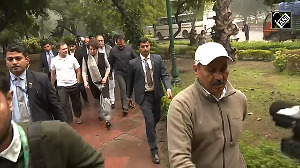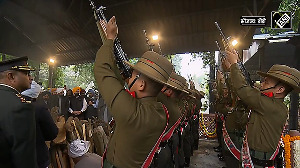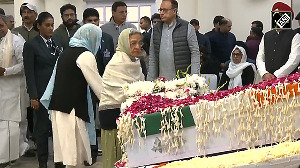Twenty five such experts said their recommendation to endorse the legislation was based on an extensive experience and expertise relating to non-proliferation policy, security issues in Asia, the domestic economic and political environment in India and Indo-US relations.
The letter, which coincides with the sending of the Bush administration's draft proposal to Congress seeking an India-specific waiver from the Atomic Energy Act of 1954, was distributed on March 10, at a meeting of the US-India Business Council here.
The letter is also a direct response to an emerging coalition of US legislators and strategists who say they will not support the nuclear deal under any circumstances.
The pro-nuke deal and pro-India forum expert say, ''Congress should support the agreement to promote US strategic interests, US non-proliferation goals, US energy security and global efforts to reduce greenhouse gas emissions leading to global warming.'' It has been signed by luminaries such as Director Asia Program Selig Harrison, who is also senior scholar at the Woodrow Wilson Centre, Associate Director Walter Andersen, South Asia Studies, at the Johns Hopkins University, former Assistant Secretary of State Rick Inderfurth, Brookings Institution Senior Fellow Stephen Cohen, two former US ambassador to India Frank Wisner and William Clark, Centre for Strategic International Studies (CSIS) Director Teresita Schaffer, Robert Hathaway, Director of Asia program, Woodrow Wilson Center, Thomas Donnell, resident fellow, American Enterprise Institute, and Harold Gould, visiting scholar, Centre for south Asian studies, University of Virginia.
The letter said the strategic argument for implementing the agreement has to take into account the rise of China. A strong, stable India will advance the traditional US objective of an Asian balance of power in which no one nation is able to exercise overwhelming dominance.
''Failure to implement the agreement would be a blow to the development of a strong relationship with India so important to achieving US goals in Asia and beyond,'' the experts contended.
The letter quoted Mohammed El Baradei, Director General of the International Atomic Energy Agency, to say that ''this agreement is an important step towards satisfying India's growing need for energy and bring it closer as an important partner in the non-proliferation regime. It would be a step forward towards universalisation of the international safeguards regime.''
Addressing the argument that the deal will inspire other countries to reactivate their own nuclear programmes, the letter said, ''In our view, what could put pressure on these countries is not the deal with India, but their own geo-political situation.'' The letter said often-expressed objection is the agreement will enable India to use its indigenous uranium for military reactors, since civilian reactors will be able to rely increasingly on imported uranium fuel.
However, The Washington Post has pointed out, ''leaving a potentially large plutonium-making programme outside the scope of multilateral inspections is not a setback relative to the status quo,'' since India would have been free to continue making as many nuclear weapons as it deemed necessary regardless of the July accord, using breeder reactors as well as uranium-fueled reactors.
Critics believe that the bargain with India may invite countries that already have nuclear weapons, like North Korea and Pakistan, or those seeking to develop a nuclear weapons option, like Iran, to demand equal treatment.
But India's record of observing Article One stands in sharp contrast to Pakistan's role as a wholesale proliferator and to the failure of Iran and North Korea to abide by their International Atomic Energy Agency commitments, the experts said.
The Bush visit: Complete coverage | Chats | The nuclear deal






 © 2024 Rediff.com -
© 2024 Rediff.com -